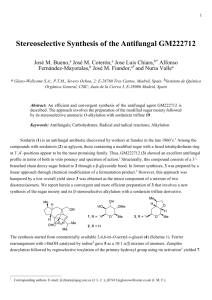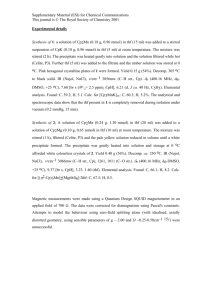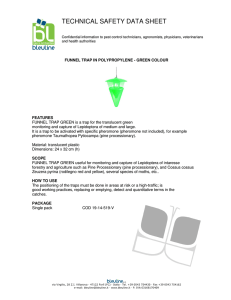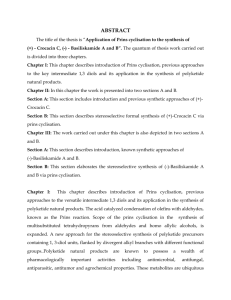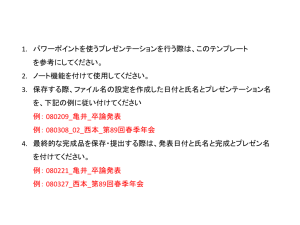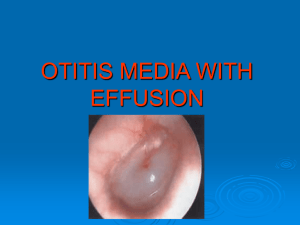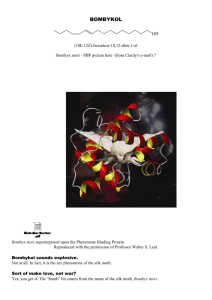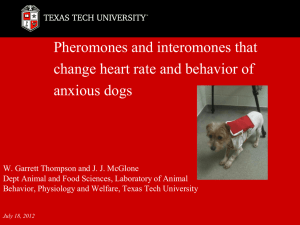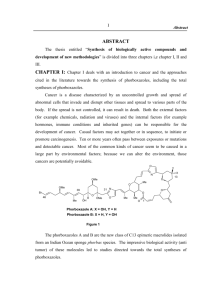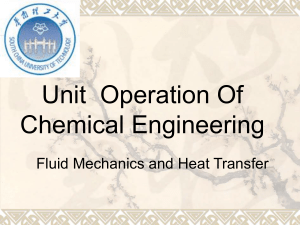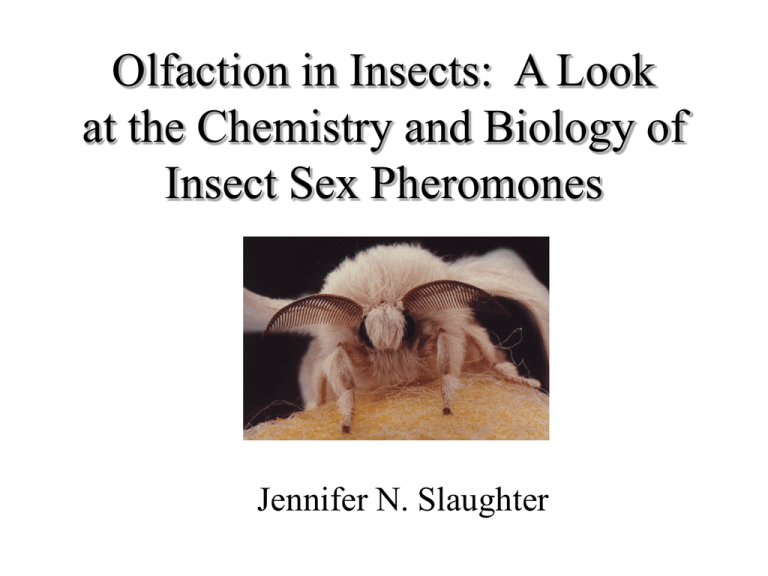
Olfaction in Insects: A Look
at the Chemistry and Biology of
Insect Sex Pheromones
Jennifer N. Slaughter
Outline
I.
Background
II.
Bombykol
III. Chemical Characterization
IV. Synthesis
1. Lineatin
2. (+)-Grandisol
3. Brazilian Stink Bug Pheromone
4. Epianastrephin
V.
Conclusions
Introduction
semiochemicals
pheromones
allelochemicals
semiochemicals (Gk. semeon, meaning mark or signal)
pheromones (Gk. pherin, to carry and hormon, to excite)
Allelochemicals (Gk. allelon, of one another)
do Nascimento, R. R.; Morgan, E. D. Quim. Nova 1996, 19, 156-65.
Applications
Biochemist: ideal models
Agricultural community: insect control (beetles)
1. monitoring
2. direct insect control
3. in conjugation with microorganisms
4. enhancing beneficial activity
Synthetic chemist: challenging targets
Krieger J; Breer, H. Science 1999, 286, 720-23.
Pheromones of Non-Lepidopteran Insects Associated with
Agricultural Plants; Hardie, J. and Minks, A. K., Eds.; 1999.
Pheromones
Insects largely perceive the world through molecular interactions.
As a result, their olfactory systems have evolved
to an acute level of sensitivity and selectivity.
Moths with feathery antenna exhibit
detection on molecular level.
>1600 insect species resulted
in >300 unique chemical structures.
A newly hatched male
gum emperor moth.
Roelofs, W. L. PNAS 1995, 92, 44-49
Stereochemistry and Activity
1. A single
enantiomer
is bioactive.
roughly
10 categories
eachO combination represented
exo-brevicomin
(western pine beetle)
O
2. A bioactive pheromone is inhibited by the enantiomer
disparlure
(male gypsy moth)
O
3. A bioactive pheromone is inhibited by the diastereomer
serricornin
(cigarette beetle)
O
OH
Mori, K. Chirality 1998, 10, 578-86.
Stereochemistry and Activity
4. Stereoisomers of the natural pheromone are also active
H
O
H
(male spined citrus bug)
OH
5. The natural pheromone is an enantiomeric mixture; both are
separately active
OH
HO
+
(female Douglas-fir beetle)
55:45 mix of R & S
6. Different stereoisomers are employed by different species
OH
OH
ipsdienol
(Californina five-spined ips)
Mori, K. Chirality 1998, 10, 578-86.
Stereochemistry and Activity
7. Both enantiomers are necessary for bioactivity; neither is
separately active
OH
OH
sucatol, 35:65 mix
(ambrosia beetle)
+
8. One enantiomer is more active than the other
OH
(ant M.
scabrinodis)
9. One enantiomer is active on males, while the other is
active on females
O
O
(R) males
O
O
olean
(olive fruit fly)
(S) females
Mori, K. Chirality 1998, 10, 578-86.
Insect Olfactory Receptor System
male silkworm moth
How Do Pheromones Get from the
Environment to the Receptor Cell?
Pheromone Transport
Pheromones are hydrophobic.
Water soluble PBPs pheromones at pore surfaces.
Elucidation of PBP-bombykol complex crystal structure
Bombykol
OH
produced by the female silkworm moth Bombyx mori
structure elucidation by Butendant and co-workers in 1959
Techniques in Pheromone Research; Hummel, H. E. and Miller, T. A., Ed.; Springer-Verlag: New York, 1984.
Crystal Structure of PBP-bombykol
The 15.9 kDa PBP has
approximate dimensions
of 40 x 35 x 30 Å.
X-ray diffraction at 1.8Å resolution.
Sandler, B. H.; Nikonova, L.; Leal, W. S.; Clardy, J. Chemistry & Biology 2000, 7, 143-51.
BmPBP Binding Pocket
Bombykol is found in a large flask-shaped cavity with a tiny
opening at the surface.
The only part of bombykol that is not surrounded by a-helices is
the hydroxyl end.
Sandler, B. H.; Nikonova, L.; Leal, W. S.; Clardy, J. Chemistry & Biology 2000, 7, 143-51.
Bombykol Binding and Release
BmPBP undergoes a pH-dependent conformational transition.
BmPBP dos not bind ligands below pH 5.
BmPBP undergoes a conformational change when mixed
with model proteins.
Briand, L.; Nespoulous, C.; Huet, J.; Takahshi, M.; Pernollet, J. Eur. J. Biochem 2001, 268, 752-60.
Horst, R.; Damberger, F.; Luginbuhl, P.; Guntert, P.; Peng, G.;Nikonova, L.; Leal, W. S.; Wuthrich, K.
PNAS 2001, 98, 14374-79.
Wojtaesk, H.; Leal, W. S. J. Bio. Chem. 1999, 274, 30950-56.
Structure of BmPBP at Low pH
The most pronounced difference
between the BmPBP complex and
BmPBPA is the appearance of
helix a-7.
1H
frequency of 750 MHz at 20ºC and
pH 4.5. For comparison, the X-ray
crystals were grown at pH 8.2.
Horst, R.; Damberger, F.; Luginbuhl, P.; Guntert, P.; Peng, G.; Nikonova, L.; Leal, W. S.; Wuthrich, K.
PNAS 2001, 98, 14374-79.
Representations of the BmPBP
Binding Pocket
BmPBP complex (pH 8.2)
BmPBP in solution (pH 4.5)
Horst, R.; Damberger, F.; Luginbuhl, P.; Guntert, P.; Peng, G.; Nikonova, L.; Leal, W. S.; Wuthrich, K.
PNAS 2001, 98, 14374-79.
Isolation and Characterization
Pheromones are obtained in small quantities as volatile oils.
The first step is the separation of insect parts.
In earlier years of pheromone research, three techniques were
widely used in the initial isolation of pheromones.
These have been replaced due to large volumes of solvent and
massive amount of insect material required.
GC, GC-MS, IR, GC-FTIR
do Nascimento, R. R.; Morgan, E. D. Quim. Nova 1996, 19, 156-65.
Determination of Stereochemistry
Stereochemical assignment by conventional analysis is
not possible.
Enantioselective synthesis of a target pheromone
Compare chiroptical properties to natural pheromone
Mori and co-workers have demonstrated the utility
this approach.
Mori, K. Chirality 1998, 10, 578-86.
(+)-Acoradiene: Determination of
Absolute Configuration
1
4
5
1R, 4R, 5S
The structure above was proposed on the basis of NMR studies.
It is a major component of the aggregation pheromone of the
broad-horned flour beetle.
unique spiro-sesquiterpene structure
Kurosawa, S.; Bando, M.; Mori, K. Eur. J. Org. Chem. 2001, 4395-99.
Retrosynthetic Strategy
OH
1
4
5
OP
OH
ring-closing
olefin metathesis
OP
O
O
O
(R)-(+)-pulegone
Kurosawa, S.; Bando, M.; Mori, K. Eur. J. Org. Chem. 2001, 4395-99.
(+)-Acoradiene
O
CO2H
1. Br2, AcOH
O
2. i) NaOMe, MeOH
ii) KOH, then dil. HCl
1. Br2, NaOH, H2O
O
2. KOtBu, tBuOH
(39%-2 steps)
(60%-2 steps)
(R)-pluegone
1. H2, PtO2, EtOAc (99%)
O
2. i) LDA, THF
ii) allyl iodide, HMPA (96%)
O
1. DIBAL-H, CH2Cl2 (98%)
2.
THF (99%)
OH
ClMg
OH
OH
1
Grubbs catalyst
4
CH2Cl2 (98%)
PCy3
ph
Cl
Cl Ru
PCy3
5
OH
Kurosawa, S.; Bando, M.; Mori, K. Eur. J. Org. Chem. 2001, 4395-99.
Absolute Configuration
OH
OH
11
11
The X-ray structure reflects the major isomer from the
cyclization (1R, 4S, 5R, 10S).
The synthetic and natural pheromones are different.
Kurosawa, S.; Bando, M.; Mori, K. Eur. J. Org. Chem. 2001, 4395-99.
Syntheses of Pheromones with
Interesting Carbon Skeletons
Lineatin
4
7
7
5
O
4
1
5
O
O
O
1
striped ambrosia beetle
1R, 4S, 5R, 7R (+)
Aggregation pheromone of female ambrosia beetle
(+)-enantiomer is the naturally occurring pheromone
a member of the first class
Baeckstrom, P.; Li, L.; Polec, I.; Unelius, C. R.; Wimalasiri, W. R. J. Org. Chem. 1991, 56, 3358-62.
Retrosynthetic Strategy
b
a
O
C
O
Key step in the synthesis of lineatin is the [2 + 2]
cycloadditions to form cyclobutane ring
Baeckstrom, P.; Li, L.; Polec, I.; Unelius, C. R.; Wimalasiri, W. R. J. Org. Chem. 1991, 56, 3358-62.
Lineatin
O
O
1. EtO
O
P OEt
OEt , LHMDA (92%, E:Z 4:1)
O
HO
2. 10% KOH, MeOH, reflux (95%, mixture)
Ac2O
1. LAH,Et2O (79%)
NaOAc
(62%)
2. Ac2O, pyridine (96%)
O
OMe
OMe
1. OsO4, NMO (83%)
2. H5IO6, Et2O (97%)
3. pTsOH, MeOH, (82%)
AcO
7
MeMgBr, Et2O
O
AcO
then 10% HCl (76%)
5
O
4
1
O
Baeckstrom, P.; Li, L.; Polec, I.; Unelius, C. R.; Wimalasiri, W. R. J. Org. Chem. 1991, 56, 3358-62.
(+)-Grandisol
HO
(+)-grandisol
HO
(+)-fraganol
100- to 200timess less active
sex pheromone of male cotton boll weevils.
alkylation and [2 + 2] cycloaddition.
Retrosynthetic Strategy
O
O
O
O O
O
HO
HO
HO
OH
[2 + 2] cycloaddition
followed by oxidative
cleavage
HO
HO
O
O
OH
OH
based on work done with C2-symmetric bis(a,b-butenolides)
asymmetric induction during the photoaddition process.
de March, P.; Figuerdo, M.; Font, J.; Raya, J. Org. Lett. 2000, 2, 163-65.
(+)-Grandisol
HO
O
HO
O
1. PhSeCHCO2-2, THF
O
O O
O
O
2. AcOH
3. H2O2, AcOH, THF
(72% overall)
O
OH
O
OH
O
HO
OH
O
1. TMSIm, THF (98%)
1. ethylene, acetone, hv
O O
2. CH2N2, ether/THF
3. 1,4-dioxane,
(85% overall)
2. TBAF, THF (65% overall)
TMSO
O
O
OTMS
O
O
O O
1. Pb(OAc)4, EtOAc
O
2. NaBH4, EtOAc
(72% overall)
HO
OH
HO
HO
Figuerdo, M.; Font, J.; Virgill, A. Tetrahedron 1987, 43, 1881-86.
de March, P.; Figuerdo, M.; Font, J.; Raya, J. Org. Lett. 2000, 2, 163-65.
Retrosynthetic Strategy
O
SO2Ph
Rh intramolecular
carbenoid cyclization
HO
OMe
N2
O
PhO2S
OMe
(+)-citronellol
OH
Monteiro, H. J.; Zuckerman-Schpector, J. Tetrahedron 1996, 52, 3879-88.
(+)-Grandisol
MeO
1. NaH, MeI, DME
O
2. OsO4, CrO3, Me2CO
3. MeOH, H2SO4, CH2Cl2
(81% overall)
OMe
OH
N2
1. PhSO2CH2Na, THF/DMSO (92%)
PhO2S
O
2. NaN3, NaOAc, MeOH
F
F
B
F
F
+
N
OMe
Cl
O
O
SO2Ph
1. Rh2(OAc)4, C6H6 (60%)
SO2Ph
NaH, THF (94%)
2. NaI, TMSCl, MeCN (71%)
I
HO
Monteiro, H. J.; Zuckerman-Schpector, J. Tetrahedron 1996, 52, 3879-88.
Brazilian Stink Bug Pheromone
O
O
R
S
structure was confirmed by synthesizing the racemic mixture
enantiomers were synthesized and separated
Kuwahara, S.; Hamade, S.; Leal, W. S.; Ishikawa, J.; Kodama, O. Tetrahedron 2000, 56, 8111-17.
Retrosynthetic Strategy
O
[TS-R]
R
O
[TS-S]
S
O
O
O
+ I
N
N
O
O
Kuwahara, S.; Ishikawa, J.; Leal, W. S.; Hamade, S.; Kodama, O. Synthesis 2000, 1930-35.
Brazilian Stink Bug
I
1.
O
O
s-BuLi,
THF-HMPA (74%)
N
N
O
2. s-BuLi, MeI, THF (84%)
3. Red-Al, THF
OH
O
1. (n-Bu)4NH2PO4, H2O-EtOH
1. LDA, PhN(Tf)2, THF (59%)
2. K2CO3, t-BuOH (45%-3 steps)
2. Me2CuLi, THF (86%)
190oC, toluene
+
methylene blue
R
S
Kuwahara, S.; Ishikawa, J.; Leal, W. S.; Hamade, S.; Kodama, O. Synthesis 2000, 1930-35.
Brazilian Stink Bug
O
1. MeLi, Et2O
R
+
1. OsO4, py,
then aq. NaHSO3
2. PCC, CH2Cl2
(62%-2 steps)
R (30%)
2. NaIO4, H2O-Et2O
3. K2CO3, t-BuOH
(65%-4 steps)
O
S
S (35%)
O
R
1. Me2CuLi, Et2O
2. PhSeCl, EtOAc,
then Na2CO3,
THF-H2O, aq H2O2
(50%-2 steps)
O
S
Kuwahara, S.; Hamade, S.; Leal, W. S.; Ishikawa, J.; Kodama, O. Tetrahedron 2000, 56, 8111-17.
Kuwahara, S.; Ishikawa, J.; Leal, W. S.; Hamade, S.; Kodama, O. Synthesis 2000, 1930-35.
Epianastrephin
O
O
O
(-)-epianastrephin
O
(+)-epianastrephin
sex pheromone mixture of the male Caribbean fruit fly
natural pheromone contains 55:45 mixture of enantiomers
a member of class five
relative stereochemistry determined by crystallographic studies
absolute stereochemistry established by chemical synthesis
Schultz, A. G.; Kirincich, S. J. J. Org. Chem. 1996, 61, 5626-30.
(-)-Epianastrephin: Retrosynthesis
OP
O
O
OH
R'
R
R
R'
CO2R
O
O
O
O
SmI2 coupling
O
Tadano, K.; Isshiki, Y.; Minami, M.; Seiichiro, O. J. Org. Chem. 1993, 58, 6266-79.
(-)-Epianastrephin
O
O
R
O
O
O
SmI2, i-PrOH
O
THF-HMPA
(53%)
O
EtO
O
O
CO2Et
O
H
O
R
O
O
O
O
O
O
O
.
EtO2C
O
I2SmO
O
O
1. LAH, THF
2. TBDPSCl,
imidazole, DMF
3. PCC, CH2Cl2,
mol. sieves
O
OH
O
Tadano, K.; Isshiki, Y.; Minami, M.; Seiichiro, O. J. Org. Chem. 1993, 58, 6266-79.
(-)-Epianastrephin
OH
O
Zn, CH2Br2,
OH
TiCl4, THF
(83%-4 steps)
1. m-CPBA, NaHCO3
CH2Cl2
OH
OH
+
2. LAH, THF
(96% overall)
OH
OH
PCC, CH2Cl2
mol. sieves
(48%)
O
O
Tadano, K.; Isshiki, Y.; Minami, M.; Seiichiro, O. J. Org. Chem. 1993, 58, 6266-79.
(+)-Epianastrephin: Retrosynthesis
OMe
O
O
iodolactonization
O
O
OMe
O
CO2R
N
Birch reduction
methylation
OMe
OMOM
Schultz, A. G.; Kirincich, S. J. J. Org. Chem. 1996, 61, 5626-30.
Schultz, A. G.; Kirincich, S. J. J. Org. Chem. 1996, 61, 5631-34.
(+)-Epianastrephin
OMe
O
K, NH3, t-BuOH, THF
N
OMe
O
N
then piperylene, MeI
(91%)
1. 10% Pd/C, H2, EtOAc (95%)
2. H2SO4, MeOH, H2O (84%)
3. HC(OMe)3, MeOH, H2SO4
4. KOH, MeOH (86%)
OMOM
OMOM
OMe
CO2H
1. NaHCO3, H2O, THF
I2, KI (85%)
1. RuO4, NaIO4, CCl4
MeCN, H2O
2. AIBN, Bu3SnH, PhH
(94%)
2. KOH, MeOH, H2O (83%)
3. (COCl)2, PhH, then
Li(t-BuO)3AlH, THF
4. SEMCl, DIPEA
O
OMe
O
OSEM
OH
1. DIBAL, CH2Cl2 (70%)
2. Ph3P=CH2, DMSO (85%)
3. HOAc, MeOH, MeCN
O
O
TPAP, NMO
OH
CH2Cl2, MeCN
(63%)
O
O
Schultz, A. G.; Kirincich, S. J. J. Org. Chem. 1996, 61, 5626-30.
Conclusions
insect olfactory system
pheromone transport (BmPBP)
isolation and characterization
synthetic challenges
Acknowledgements
Members of the Mecozzi Group:
Sandro
Khanh
Oana
Peers:
Whitney Erwin Valerie Keller
Jason Pontrello Margaret Biddle
Lisa Jungbauer John Campbell
Erik Puffer
Scott Petersen
Matthias Brewer Nero Shah
Konstantin Levitsky

